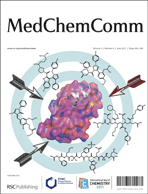
In this review Antonio Macchiarulo (University of Perugia) and team have sought to pull together recent breakthroughs on the lesser studied MDMX. MDMX is structurally similar to MDM2, but interestingly cells appear unable to compensate for the loss of one negative regulator with the other – they regulate non-overlapping functions. The review highlights new structural information available for MDMX and recent studies on the potential of dual MDMX and MDM2 inhibitors. The conclusion – we need to develop more small molecules selective for MDMX to further understand and validate its potential as a therapeutic target.
This interesting article is on the cover of our latest issue – Issue 6 – and is currently free to access:
Expanding the horizon of chemotherapeutic targets: From MDM2 to MDMX (MDM4)
Antonio Macchiarulo, Nicola Giacchè, Andrea Carotti, Fabiola Moretti and Roberto Pellicciari
Med. Chem. Commun., 2011, 2, 455-465
DOI: 10.1039/C0MD00238K










